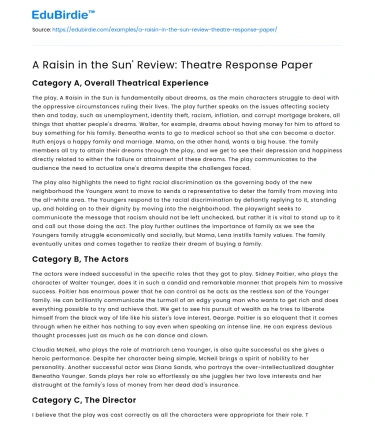Category A, Overall Theatrical Experience
The play, A Raisin in the Sun is fundamentally about dreams, as the main characters struggle to deal with the oppressive circumstances ruling their lives. The play further speaks on the issues affecting society then and today, such as unemployment, identity theft, racism, inflation, and corrupt mortgage brokers, all things that shatter people's dreams. Walter, for example, dreams about having money for him to afford to buy something for his family. Beneatha wants to go to medical school so that she can become a doctor. Ruth enjoys a happy family and marriage. Mama, on the other hand, wants a big house. The family members all try to attain their dreams through the play, and we get to see their depression and happiness directly related to either the failure or attainment of these dreams. The play communicates to the audience the need to actualize one's dreams despite the challenges faced.
The play also highlights the need to fight racial discrimination as the governing body of the new neighborhood the Youngers want to move to sends a representative to deter the family from moving into the all-white area. The Youngers respond to the racial discrimination by defiantly replying to it, standing up, and holding on to their dignity by moving into the neighborhood. The playwright seeks to communicate the message that racism should not be left unchecked, but rather it is vital to stand up to it and call out those doing the act. The play further outlines the importance of family as we see the Youngers family struggle economically and socially, but Mama, Lena instills family values. The family eventually unites and comes together to realize their dream of buying a family.
Category B, The Actors
The actors were indeed successful in the specific roles that they got to play. Sidney Poitier, who plays the character of Walter Younger, does it in such a candid and remarkable manner that propels him to massive success. Poitier has enormous power that he can control as he acts as the restless son of the Younger family. He can brilliantly communicate the turmoil of an edgy young man who wants to get rich and does everything possible to try and achieve that. We get to see his pursuit of wealth as he tries to liberate himself from the black way of life like his sister's love interest, George. Poitier is so eloquent that it comes through when he either has nothing to say even when speaking an intense line. He can express devious thought processes just as much as he can dance and clown.
Claudia McNeil, who plays the role of matriarch Lena Younger, is also quite successful as she gives a heroic performance. Despite her character being simple, McNeil brings a spirit of nobility to her personality. Another successful actor was Diana Sands, who portrays the over-intellectualized daughter Beneatha Younger. Sands plays her role so effortlessly as she juggles her two love interests and her distraught at the family's loss of money from her dead dad's insurance.
Category C, The Director
I believe that the play was cast correctly as all the characters were appropriate for their role. The actors were able to portray honesty within the play, which makes it such an explosive play. Despite being such a difficult thing to achieve, simple honesty is shown in such an illuminating manner by the actors. The actors are also able to bring out the comics and crises within the play beautifully. All the actors cast were black is also another proof that the play was cast correctly. The play's author, Lorraine Hansberry, wrote it to portray the lives of black people, and casting them is nothing short of appropriate.






 Stuck on your essay?
Stuck on your essay?

